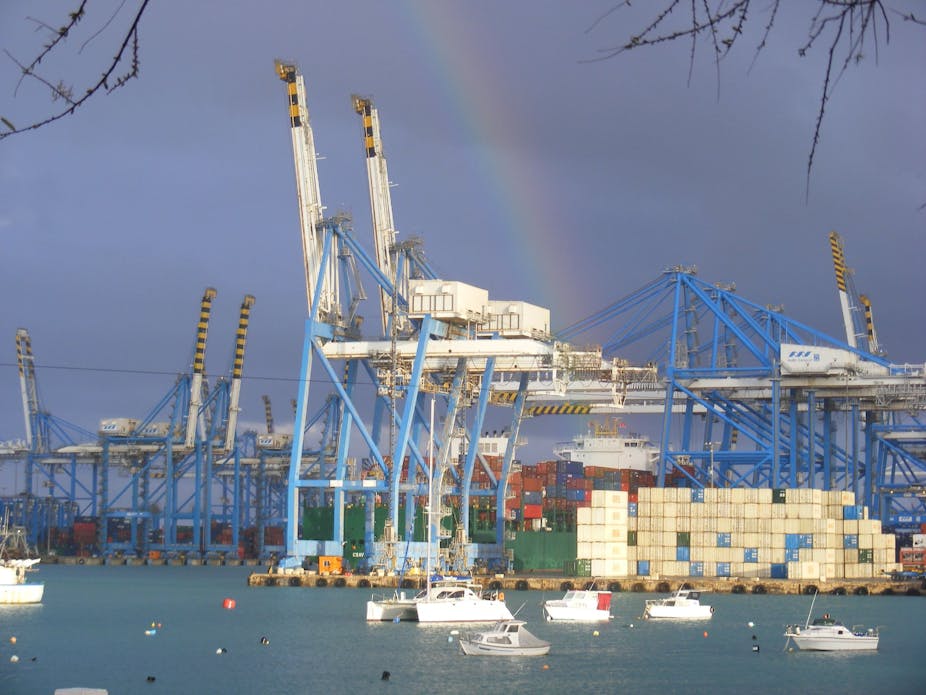While Brexit sounds like a cataclysm to many, some in the UK see the glass as half full – and highlight the opportunities rather than the risks. From their perspective, the UK will remain a privileged partner of the EU and be at the heart of the Commonwealth. Those welcoming Brexit see this position as being one that the UK can exploit.
Rishi Sunak, a Conservative member of the British parliament, has submitted a report that calls on Theresa May, the British prime minister, to take advantage of Brexit by creating free-trade zones in the UK. Such areas in major ports would attract investors and industries and create jobs – up to 86,000, according to Sunak.
EU reticence on free ports
Free ports are an old recipe from the Phoenicians for commercial success. They were also the source of wealth of the Hanseatic ports such as Hamburg, Bremen and Copenhagen as well as the Mediterranean ports of Trieste, Venice and Marseille during the Renaissance. Today some developing countries have seized the concept, with major successes including Dubai, Shenzhen, Tangier and Shanghai, while developed countries – including some US ports and airports – have adapted the concept to their needs.
Modern free ports are considered to be outside the customs area of the nation or free-trade zone (the EU, for example) within which they’re situated and thus allow firms operating there to temporarily avoid the frictions generated by border crossings – not only customs, but also physical, administrative and cultural constraints. Within free ports, firms can coordinate international flows of goods and even transform them there, “exporting” from the free port when goods are ready. A free port is thus an interface between nations and/or single markets, enabling firms to bring more value to their global supply chains.
While continental Europe was the birthplace of free ports, the EU neither develops them directly nor encourages them. Free ports existing before host states entered the Union have partly retained their status, but new ones have not been created. There are several reasons for this, the first doctrinal: free-trade zones would create unfair competition between firms operating under the EU general legal provisions and those operating in the duty-free area of the free port. Free ports, however, attract goods that would otherwise go elsewhere and thus enable the creation of additional value – precisely what Sunak is proposing that the UK should do.
Beyond clichés
There is a also psychological reluctance on the part of the EU towards embracing alleged aspects of trade in free ports. Some have been associated with money laundering, questionable storage of artworks, and tax avoidance.
These are in fact largely caricatures. In most free ports, goods are under customs supervision and thus are often more controlled than elsewhere because traceability is one of the logistical services offered.
Finally, there is a reluctance that stems from ignorance. The free port is often summed up by one of its characteristics: extra-territorial customs. That is, when goods enter a free port, they are within the physical territory of a country yet not within its customs boundary.
Yet these circumstances create the market. A free port in fact attracts flows of goods, capital and skills, and allows them to flourish. This is known as “embedding”, because the free port can showcase local resources (know-how, raw materials, industries, cultural benefits, etc) and enables them to connect to global markets.
An opportunity
Given the reluctance of the EU to reinvigorate the free port model, the report suggests that there is an opportunity to be seized by the UK’s positioning itself at the interface between the Commonwealth, producing semi-finished products, and the huge European market, consumer of finished goods.
The process would work like this: import semi-finished products from Commonwealth countries into UK free ports on privileged terms; store and process them there, allowing a “Made in the UK” label to be added; and finally re-export them towards the EU under privileged terms.
North Africa and Turkey have similar strategies, but targeting smaller products such as textiles, car wiring harnesses, fruit and vegetables. Rishi Sunak’s team has suggested that up to 86,000 jobs could be created this way. Moreover, this isn’t some petty manouvre, as the EU has effectively abandoned the idea of free ports.
On the other hand, the opportunistic thinking raises questions about how Europe has been constructed – what binds the Continent together and how it can move forward. In the case of free ports, should the EU continue to stand against the world, globalisation and liberalism? If so, it must propose an alternative. Rethinking its position against free ports could allow the EU to propose a model of economic development adapted to the globalised economy – and pull the rug out from under its soon-to-be former member.
Translated from the original French by Leighton Walter Kille.


